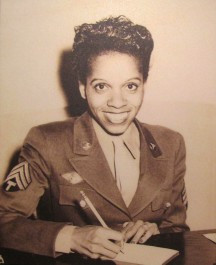[ Civil rights pioneer Edna Griffin in her Women's Army Corps uniform, Fort Des Moines, WWII. Image courtesy of Fort Des Moines Museum.
Civil rights pioneer Edna Griffin in her Women's Army Corps uniform, Fort Des Moines, WWII. Image courtesy of Fort Des Moines Museum.
Long before Rosa Parks became a symbol of the Civil Rights movement and Martin Luther King Jr.’s iconic speeches echoed across the nation, Edna Griffin, a resident of Iowa, was already a force for change. Griffin stands as a significant, yet often unheralded, Civil Rights Pioneer Griffin, initiating her courageous fight for equality well before the movement gained widespread recognition. Her story is a testament to early activism and the profound impact one individual can have on the landscape of civil rights in America.
Born Edna McKnight on October 23, 1909, in Lexington, Kentucky, Griffin’s upbringing in rural New Hampshire laid the foundation for her future endeavors. The daughter of a dairy farm supervisor, she pursued higher education at Fisk University in Nashville, Tennessee, graduating in 1933 with aspirations of becoming a teacher. It was at Fisk that she met her husband, Stanley Griffin. Their journey led them to Des Moines, Iowa, in 1947, as Stanley pursued studies at Still College of Osteopathy and Surgery, now Des Moines University.
Des Moines became the backdrop for Griffin’s burgeoning activism. The Griffins chose to reside in the Beaverdale neighborhood, an area that was not traditionally home to African American families at the time. Mikel Johnson, a friend and former neighbor, noted, “A black family moving into Beaverdale during that period of time certainly took some strength of character.” This move itself was an early act of defiance against societal norms, setting the stage for Griffin’s more direct confrontations with racial injustice.
It was in Des Moines that Edna Griffin’s name became synonymous with the fight against discrimination in Iowa. On a sweltering July 7th in 1948, Griffin, accompanied by John Bibbs, Leonard Hudson, and her infant daughter Phyllis, sought service at Katz Drug Store in downtown Des Moines. When Griffin ordered an ice cream soda, they were denied service with the blatant explanation that the store was “not equipped to serve colored people.” This act of blatant racism ignited a fire in Griffin, propelling her into a battle that would challenge the status quo and reshape civil rights in Iowa.
Refusing to accept this discriminatory treatment, Griffin, alongside Bibbs and Hudson, who were fellow activists committed to racial equality and members of the Progressive Party of Iowa, decided to take action. Johnson recounts that Griffin spearheaded a sustained campaign of protest. For two months, every Saturday, she organized boycotts, conducted sit-ins, and picketed in front of Katz Drug Store, located at the corner of Seventh and Locust streets. Their unwavering determination to dismantle segregation led them to file charges against the store owner, Maurice Katz, in November 1948. They invoked the Iowa Civil Rights Act of 1884, which explicitly prohibited discrimination in public accommodations.
The ensuing criminal trial became a focal point of statewide attention. The jury’s verdict found Katz guilty, resulting in a $50 fine. Katz appealed, but the Iowa Supreme Court upheld the conviction in December 1949, solidifying the legal victory.
While the criminal appeal was underway, Griffin pressed forward with a civil suit in Polk County District Court, seeking $10,000 in damages for the emotional and social harm caused by the discriminatory incident at Katz Drug Store in July 1948.
[ Civil rights pioneer Edna Griffin in her Women's Army Corps uniform, Fort Des Moines, WWII. Image courtesy of Fort Des Moines Museum.
Civil rights pioneer Edna Griffin in her Women's Army Corps uniform, Fort Des Moines, WWII. Image courtesy of Fort Des Moines Museum.
In the civil trial, Griffin received legal support from local representatives of the National Association for the Advancement of Colored People (NAACP) Legal Defense Fund. An all-white jury heard her case and, siding with Griffin, awarded her $1 in damages. Although the monetary amount was nominal, her lawyer declared it a “moral victory.” This landmark legal outcome had far-reaching consequences: lunch counters, soda fountains, and restaurants across Des Moines were legally obligated to serve African Americans, marking a significant step towards desegregation in the city.
Mikel Johnson aptly summarized Edna Griffin’s enduring legacy: “Edna Griffin fought for civil rights for African-Americans and all people, but she also fought for all people across all the protected classes. She was a true advocate for peace and human rights.” Edna Griffin’s relentless pursuit of justice cemented her place as a civil rights pioneer griffin, not just in Iowa but in the broader narrative of American civil rights history. Her courageous actions and unwavering commitment to equality serve as an inspiration, reminding us of the power of individual action in the fight for social change.


